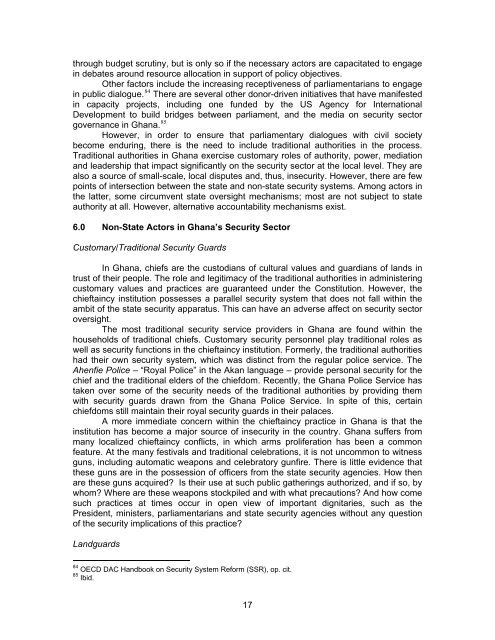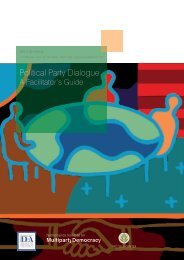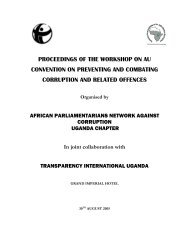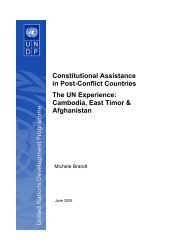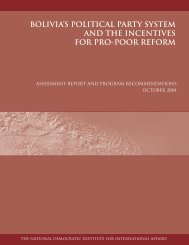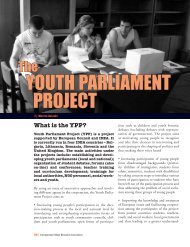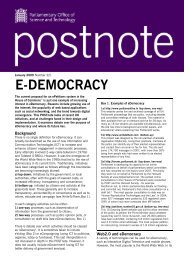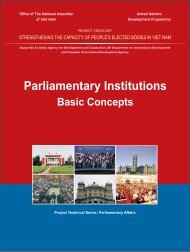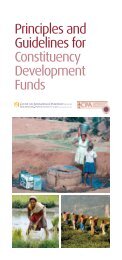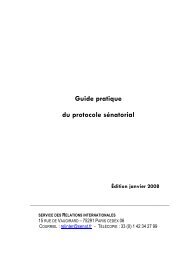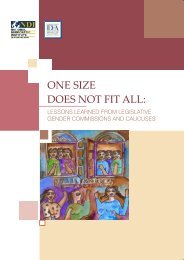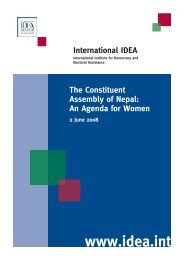ultimately ineffective if equal consideration is not given to managing its implementation.Those involved in designing <strong>the</strong> inception phase and planning long-term assistance<strong>the</strong>refore need to remain closely involved in <strong>the</strong> management <strong>of</strong> <strong>the</strong> inception activitiesto ensure continuity, institutional memory, and <strong>the</strong> confidence <strong>of</strong> local stakeholders. 81This process yielded several lessons, <strong>the</strong> most significant <strong>of</strong> which is that <strong>the</strong>involvement <strong>of</strong> a wide spectrum <strong>of</strong> stakeholders through <strong>the</strong> series <strong>of</strong> workshopsresulted in a practical, common understanding <strong>of</strong> – and recognition <strong>of</strong> <strong>the</strong> utility <strong>of</strong> –security sector reform issues. It also resulted in <strong>the</strong> creation <strong>of</strong> a lasting network <strong>of</strong>individuals and organizations interested in supporting progressive transformation <strong>of</strong> <strong>the</strong>security sector. Through this network, a locally-designed and -led course on securitysector governance and management was developed. Delivered by an alliance <strong>of</strong><strong>Ghana</strong>ian institutions, <strong>the</strong> annual course is managed by a steering team jointly chairedby <strong>the</strong> Office <strong>of</strong> <strong>the</strong> President and <strong>the</strong> Office <strong>of</strong> <strong>the</strong> Head <strong>of</strong> <strong>the</strong> Civil Service. Similarly, inpartnership with <strong>Ghana</strong> Institute for Management and Public Administration (GIMPA)and <strong>the</strong> Department <strong>of</strong> Political Science <strong>of</strong> <strong>the</strong> University <strong>of</strong> <strong>Ghana</strong>, African <strong>Security</strong>Dialogue and Research has built upon its contacts and local knowledge to ensure anapproach tailored to <strong>Ghana</strong>ian realities; one that was effective in guiding and developing<strong>the</strong> curriculum and bringing <strong>the</strong> broader agenda <strong>of</strong> a larger stakeholder participation t<strong>of</strong>ruition within a complex political environment. Its engagement in this programme hasenabled <strong>the</strong> involved organizations to build trust, credibility, and relationships with arange <strong>of</strong> individuals and organizations across and within and outside <strong>of</strong> government.This is reflected in <strong>the</strong> fact that <strong>the</strong> <strong>Parliamentary</strong> Select Committee on Defenceand <strong>Security</strong> now engages <strong>the</strong> technical services <strong>of</strong> <strong>the</strong>se institutions to provideseminars and capacity building training workshops for parliamentarians. The willingnessto adapt to a changing environment and to utilize opportunities as <strong>the</strong>y arose was acrucial factor in <strong>the</strong> successes achieved through <strong>the</strong> MoD initiative. Although <strong>the</strong> initialobjective <strong>of</strong> supporting a significant enhancement in <strong>the</strong> capacity <strong>of</strong> <strong>the</strong> civiliancomponent <strong>of</strong> <strong>the</strong> MoD was not fully realized, unintended, but real and sustainedprogress was made in areas that were not originally envisaged, including catalyzingpublic dialogues on security issues that in turn have encouraged broader reforms.Ano<strong>the</strong>r key lesson was <strong>the</strong> strategy to directly link <strong>the</strong> initiative to <strong>the</strong> ongoing crossgovernmentcivil service reform programme. This initiative was particularly important inplacing reform within <strong>the</strong> MoD in <strong>the</strong> wider context <strong>of</strong> public sector reform and inbroadening participation in <strong>the</strong> process to include those <strong>from</strong> outside <strong>the</strong> securitysystem. 82The resulting civil servant training program is now well-established and providesan important forum for building understanding and promoting discussions on a widevariety <strong>of</strong> security and justice issues. It enjoys high-level <strong>of</strong>ficial support and pr<strong>of</strong>ile, and<strong>the</strong> course is contributing to laying <strong>the</strong> foundations for effective governance <strong>of</strong> securitysystem, and <strong>the</strong>reby consolidating <strong>Ghana</strong>’s democratic transition. 83The opportunity for <strong>the</strong> increased parliamentary and civil society dialogue hasbeen fur<strong>the</strong>r improved by <strong>the</strong> growing transparency <strong>of</strong> <strong>the</strong> budgetary process through <strong>the</strong>introduction <strong>of</strong> <strong>the</strong> Medium-Term Expenditure Framework (MTEF) that was initiated by<strong>the</strong> Ministry <strong>of</strong> Finance. The MTEF provides a key entry point for <strong>Parliamentary</strong> oversight81 Ibid, 39.82 Ibid, 39. For a more detailed discussion <strong>of</strong> some <strong>of</strong> <strong>the</strong> broader dynamics here, see Kwesi Aning,“Managing <strong>the</strong> <strong>Security</strong> <strong>Sector</strong> in <strong>Ghana</strong>,” Understanding Good Governance in <strong>Ghana</strong>, ed. BaffourAgyeman-Duah & Alfred Salia Fawundu, (Accra: Graphic Publications, forthcoming).83 Ibid, 39.16
through budget scrutiny, but is only so if <strong>the</strong> necessary actors are capacitated to engagein debates around resource allocation in support <strong>of</strong> policy objectives.O<strong>the</strong>r factors include <strong>the</strong> increasing receptiveness <strong>of</strong> parliamentarians to engagein public dialogue. 84 There are several o<strong>the</strong>r donor-driven initiatives that have manifestedin capacity projects, including one funded by <strong>the</strong> US Agency for InternationalDevelopment to build bridges between parliament, and <strong>the</strong> media on security sectorgovernance in <strong>Ghana</strong>. 85However, in order to ensure that parliamentary dialogues with civil societybecome enduring, <strong>the</strong>re is <strong>the</strong> need to include traditional authorities in <strong>the</strong> process.Traditional authorities in <strong>Ghana</strong> exercise customary roles <strong>of</strong> authority, power, mediationand leadership that impact significantly on <strong>the</strong> security sector at <strong>the</strong> local level. They arealso a source <strong>of</strong> small-scale, local disputes and, thus, insecurity. However, <strong>the</strong>re are fewpoints <strong>of</strong> intersection between <strong>the</strong> state and non-state security systems. Among actors in<strong>the</strong> latter, some circumvent state oversight mechanisms; most are not subject to stateauthority at all. However, alternative accountability mechanisms exist.6.0 Non-State Actors in <strong>Ghana</strong>’s <strong>Security</strong> <strong>Sector</strong>Customary/Traditional <strong>Security</strong> GuardsIn <strong>Ghana</strong>, chiefs are <strong>the</strong> custodians <strong>of</strong> cultural values and guardians <strong>of</strong> lands intrust <strong>of</strong> <strong>the</strong>ir people. The role and legitimacy <strong>of</strong> <strong>the</strong> traditional authorities in administeringcustomary values and practices are guaranteed under <strong>the</strong> Constitution. However, <strong>the</strong>chieftaincy institution possesses a parallel security system that does not fall within <strong>the</strong>ambit <strong>of</strong> <strong>the</strong> state security apparatus. This can have an adverse affect on security sectoroversight.The most traditional security service providers in <strong>Ghana</strong> are found within <strong>the</strong>households <strong>of</strong> traditional chiefs. Customary security personnel play traditional roles aswell as security functions in <strong>the</strong> chieftaincy institution. Formerly, <strong>the</strong> traditional authoritieshad <strong>the</strong>ir own security system, which was distinct <strong>from</strong> <strong>the</strong> regular police service. TheAhenfie Police – “Royal Police” in <strong>the</strong> Akan language – provide personal security for <strong>the</strong>chief and <strong>the</strong> traditional elders <strong>of</strong> <strong>the</strong> chiefdom. Recently, <strong>the</strong> <strong>Ghana</strong> Police Service hastaken over some <strong>of</strong> <strong>the</strong> security needs <strong>of</strong> <strong>the</strong> traditional authorities by providing <strong>the</strong>mwith security guards drawn <strong>from</strong> <strong>the</strong> <strong>Ghana</strong> Police Service. In spite <strong>of</strong> this, certainchiefdoms still maintain <strong>the</strong>ir royal security guards in <strong>the</strong>ir palaces.A more immediate concern within <strong>the</strong> chieftaincy practice in <strong>Ghana</strong> is that <strong>the</strong>institution has become a major source <strong>of</strong> insecurity in <strong>the</strong> country. <strong>Ghana</strong> suffers <strong>from</strong>many localized chieftaincy conflicts, in which arms proliferation has been a commonfeature. At <strong>the</strong> many festivals and traditional celebrations, it is not uncommon to witnessguns, including automatic weapons and celebratory gunfire. There is little evidence that<strong>the</strong>se guns are in <strong>the</strong> possession <strong>of</strong> <strong>of</strong>ficers <strong>from</strong> <strong>the</strong> state security agencies. How <strong>the</strong>nare <strong>the</strong>se guns acquired? Is <strong>the</strong>ir use at such public ga<strong>the</strong>rings authorized, and if so, bywhom? Where are <strong>the</strong>se weapons stockpiled and with what precautions? And how comesuch practices at times occur in open view <strong>of</strong> important dignitaries, such as <strong>the</strong>President, ministers, parliamentarians and state security agencies without any question<strong>of</strong> <strong>the</strong> security implications <strong>of</strong> this practice?Landguards84 OECD DAC Handbook on <strong>Security</strong> System Reform (SSR), op. cit.85 Ibid.17


